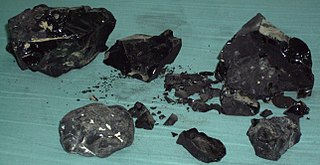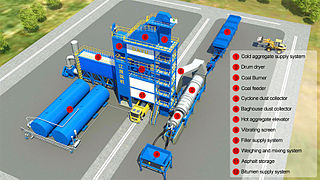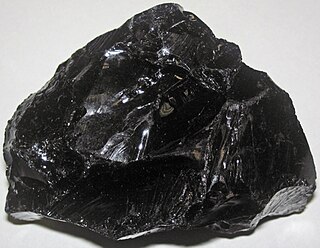 W
WAsphalt, also known as bitumen, is a sticky, black, highly viscous liquid or semi-solid form of petroleum. It may be found in natural deposits or may be a refined product, and is classed as a pitch. Before the 20th century, the term asphaltum was also used. The word is derived from the Ancient Greek ἄσφαλτος ásphaltos. The largest natural deposit of asphalt in the world, estimated to contain 10 million tons, is the Pitch Lake located in La Brea in southwest Trinidad, within the Siparia Regional Corporation.
 W
WAsphalt concrete is a composite material commonly used to surface roads, parking lots, airports, and the core of embankment dams. Asphalt mixtures have been used in pavement construction since the beginning of the twentieth century. It consists of mineral aggregate bound together with asphalt, laid in layers, and compacted. The process was refined and enhanced by Belgian-American inventor Edward De Smedt.
 W
WAn asphalt plant is a plant used for the manufacture of asphalt, macadam and other forms of coated roadstone, sometimes collectively known as blacktop or asphalt concrete.
 W
WAsphaltenes are molecular substances that are found in crude oil, along with resins, aromatic hydrocarbons, and saturates. The word "asphaltene" was coined by Boussingault in 1837 when he noticed that the distillation residue of some bitumens had asphalt-like properties. Asphaltenes in the form of asphalt or bitumen products from oil refineries are used as paving materials on roads, shingles for roofs, and waterproof coatings on building foundations.
 W
WAsphaltite is a naturally occurring soluble solid hydrocarbon, a form of asphalt with a relatively high melting temperature. Its large-scale production occurs in the Uintah Basin of Utah and Colorado, United States. Although the substance has been historically mined in the Uintah Basin, resources are being discovered and mined more recently in other countries such as Colombia and Iran. Gilsonite is mined in underground shafts and resembles shiny black obsidian. Discovered in the 1860s, it was first marketed as a lacquer, electrical insulator, and waterproofing compound approximately 25 years later by Samuel H. Gilson.
 W
WLong-Term Pavement Performance Program, known as LTPP, is a research project supported by Federal Highway Administration (FHWA) to collect and analyze pavement data in the United States and Canada. Currently, the LTPP acquires the largest road performance database.
 W
WMacadam is a type of road construction, pioneered by Scottish engineer John Loudon McAdam around 1820, in which single-sized crushed stone layers of small angular stones are placed in shallow lifts and compacted thoroughly. A binding layer of stone dust may form; it may also, after rolling, be covered with a binder to keep dust and stones together. The method simplified what had been considered state-of-the-art at that point.
 W
WThe Pörner Group is an Austrian technology orientated, engineering and contracting company working on projects for the process industry. The headquarters are situated in Vienna, Austria. The group of companies specialises in various engineering industries such as oil refineries, chemical plants, petrochemical plants, gas plants, power generation, industrial production and the pharmaceutical industry. The organization is made up of a network of several medium-sized companies in these industries.
 W
WSealcoating, or pavement sealing, is the process of applying a protective coating to asphalt-based pavements to provide a layer of protection from the elements: water, oils, and U.V. damage.
 W
WThe tarmac scam is a confidence trick in which criminals sell fake or shoddy tarmac (asphalt) and driveway resurfacing. It is particularly common in Europe but practiced worldwide. Other names include tarmacking, the asphalt scam, driveway fraud or similar variants. Non-English names include "Truffa dell'asfalto" (Italian), "Teerkolonne" (German) and "les faux bitumeurs" (French).